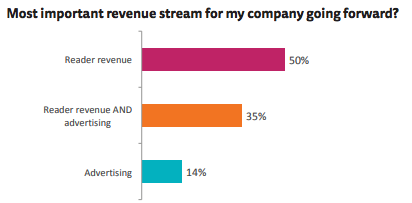Blog
Learnings from this year's Reuters predictions
Every year the Reuters Institute surveys news media leaders on what they will be focusing on for the next year. This year’s report is full of valuable insights and is definitely well worth a read. We have identified the top trends publishers will need to account for in their 2020 strategies.
Reader revenues reign supreme
More and more publishers are turning to reader revenue strategies, with 50% of surveyed executives saying this will be their main income stream going forward. This comes after many publishers reported worse than expected results from advertising in 2019.

As reader revenue strategies become more common, we will start to see this change happen in smaller markets and with smaller publishers. Already Southern European publishers are leaning into subscription models with Spanish daily El Mundo starting to charge for premium content, while El País is set to follow shortly. Smaller publishers are moving to reader revenue strategies as well, such as the Danish slow-news media company Zetland which has hit the tipping point for profitability thanks to its membership model.
New positive vibes among media leaders
After a few years of a seemingly downward turn in the news industry, this year media executives report feeling rather positive. In an interesting twist, most news media executives reported feeling confident about their own company’s future while being much less sure about the future of the journalism industry as a whole.

Many of the 73% of respondents who feel confident about their own companies seem to believe their reader revenue and diversification strategies have started to pay off. On the other hand, there are still widespread concerns about the decline of local news, the economic and political pressure on journalists, and misinformation campaigns.
Personalisation – for big and small?
Of course the report talks about AI, with highlights from the many different initiatives we saw across the globe in 2019. Over half of the respondents stated AI-driven personalisation initiatives will be very important for them this year. One such initiative mentioned in the report was our work with The Times of London on “JAMES, Your Digital Butler“. This year the team at The Times will work to further leverage the benefits of this hyper-personalisation engine, while making clear the distinction between their editorial and non-editorial use of AI. Their slogan ‘written by humans, curated by humans, distributed by robots’ will help to clarify this strategy.
However the complexities of AI have served to make it seemingly the realm of larger publishers only. This trend is only worsening as publishers continue to fight over the tech talent pool with large tech platforms; the majority of publishers do not feel confident in their ability to retain their data scientists and technologists this year, as tech platforms continue to hire more and more. At Twipe we are fighting to change this trend by working to bring JAMES to the wider market. We are currently selecting our next partners for the new launch of JAMES, do get in touch if you are interested in learning more.
Audio continues to grow
Audio was a hot topic last year, and we expect this to only grow in 2020. The majority of surveyed publishers report that podcast initiatives will be important for them this year, while others will start to look at turning text articles into audio to capitalise on this trend.
Until now, much of the audio growth has been confined to the English-speaking world but this is set to change in 2020. Brazil is now the second-largest podcasting market, while in Europe both Spain and France are seeing strong audio audience growth. The mainstream adoption of more immersive, feature-rich headphones (such as AirPod Pro) will also further boost audio formats.
Revival of editions
At Twipe, we have long been advocates for the revival of editions in the news media industry, so we are happy to see the Reuters report covers this in-depth. Previous research from Reuters shows us that the largest group of news consumers are “daily briefers“: people who typically access the news once or just a few times per day. This new report builds on this research and argues that editions are a good way to meet the needs of such readers.
In a world dominated by endless news feeds, finite editions are having a comeback. Editions are a
Eduardo Suárez, Head of Communications, Reuters Institute for the Study of Journalism
great way to foster loyalty among subscribers and recreate the news habits of the past
Next month we will be publishing the newest chapter in our research series “Reinventing Digital Editions“, which will look at exactly this question of how publishers can rebuild the print habits of yesteryear in their digital products today. Subscribe here to receive the report when it is released.
Other Blog Posts

Stay on top of the game
Subscribe to Twipe’s weekly newsletter to receive industry insights, case studies, and event invitations.
"(Required)" indicates required fields

